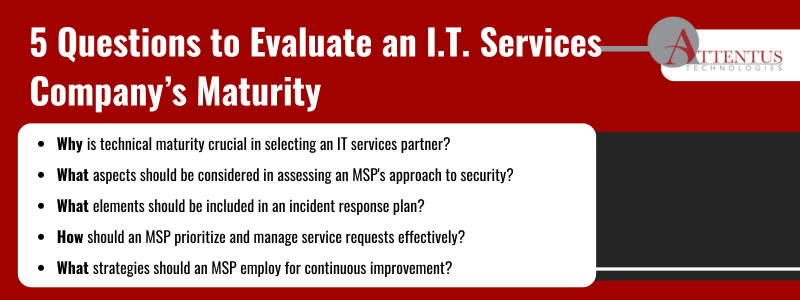When it comes to partnering for I.T. services, maturity is a good thing. Here’s what to ask to determine if a managed services provider (MSP) has the experience and expertise you need.

One definition of technical maturity is “an organization’s ability to respond and adapt to disruptive technological trends.” In other words, as technology evolves, so should your organization.
So, understanding the “I.T. service management maturity model” is very important when choosing a managed services partner (MSP). You want a firm that you entrust with many of your technological capabilities to anticipate disruptive trends in business technology. After all, such disruption could make or break you.
So, what questions should you ask to evaluate an MSP’s I.T. maturity model? The following five should help you determine whether your potential partner is fully worthy of earning your trust. The answers should help you decide if they will meet your expectations for service and digital expertise.
1. What is your approach to I.T. security and compliance?
Because of its importance, you must pose this question at the outset of the business process maturity assessment. Cybersecurity protects sensitive data such as customer, financial, and intellectual property. You want an I.T. MSP that can implement strong security protocols and procedures and continuously monitor them to reduce the risk of data breaches, whether they involve ransomware, malware, phishing, or many other threats.
Today, it’s not a matter of whether your company will be a cyberattack victim but when. Businesses, both large and small, are all at risk. So, you need an I.T. partner with proven capabilities in implementing effective cybersecurity precautions, which should include:
- A sound strategy
- Regular software updates
- Secure Wi-Fi networks
- Employee training
- A strong password policy
- Multifactor encryption
- Round-the-clock monitoring
- And more
Your organization needs clear requirements for security, data protection, and access. A reliable I.T. provider can assist in meeting these standards or help develop them if they’re lacking.
2. Can you describe your incident response plan?
How your potential I.T. partner answers this question in a business process maturity model assessment reveals how ready and systematic they are to deal with potential crises. The U.S. government Cybersecurity & Infrastructure agency, points out that it is essential to have a written incident response plan (IRP) in place, approved by company leadership, outlining what should be done before, during, and after a confirmed security incident.
“Your IRP will clarify roles and responsibilities and will provide guidance on key activities. It should also include a cybersecurity list of key people who may be needed during a crisis,” it explains.
To minimize the disruptions caused by I.T. disruption, an MSP’s IRP should cover the following:
- Preparation and prevention
- Detection and analysis
- Response, including containment and eradication
- Learning from past incidents to improve future responses
3. How do you manage and prioritize service requests?
For an MSP to be effective, its I.T. service management maturity model must have a clearly defined procedure for managing and prioritizing service requests. How quickly and accurately can a ticket be escalated to the correct authority? How does the process maturity assessment differentiate between critical and non-critical tickets?
The system might assign an ascending level of priorities, such as:
- Non-critical
- Medium priority
- High priority
The system should also be agile enough to distinguish between critical tickets and those that aren’t (they won’t have much impact on your business and its reputation) but recognize when the latter type still needs a quick response.
For example, a single person accidentally deleting important information from their personal computer isn’t the same kind of emergency as an organization losing critical data. Still, the situation is urgent for that person and must be treated that way.
The processes an I.T. services provider uses to handle such requests reflect its operational maturity and the quality of its customer service.

4. What strategies do you employ for continuous improvement?
As technology evolves, so too do the potential threats to businesses. Your MSP must prioritize continuous improvement in its maturity model (including specific frameworks like the ITIL maturity model). They should consistently update their knowledge and tools to stay prepared, demonstrating dedication to delivering value and remaining relevant.
Strategies for continuous improvement incorporate proactive intervention to identify potential issues before they become a problem. Then, the MSP must have the methodology to test potential solutions and verify their effectiveness. Next, they must have the capabilities to deploy the solution properly.
Finally, they must leave room in the process to step back and review all the preceding steps and results so they can improve everything for future challenges.
5. How do you measure and report performance and success?
This is an important question if you want to evaluate maturity in an I.T. service management assessment (ITSM assessment). If an MSP doesn’t have set performance metrics, how can you judge their performance and maturity level? The metrics could include:
- The mean time to respond to or resolve an issue.
- The mean time to recovery
- Systems uptime
- Cost per ticket
- Customer satisfaction rating
- SLA (service level agreement) adherence
How an MSP measures and shares its success indicators can demonstrate its commitment to accountability and focus on results.
Please ask us anything
At Attentus Technologies, we can answer all your questions—and we welcome them. The more information you have, the better you can make the technological decisions essential to your organization’s survival and success.
As a proven and mature I.T. services company, we are completely dedicated to the core value of building trusted relationships. Trust helps to smooth all interactions, increasing efficiency, boosting productivity, and saving time.
We realize that trust is always earned and commit to earning yours.
Contact us today for a free consultation and technology assessment. And then ask away.

